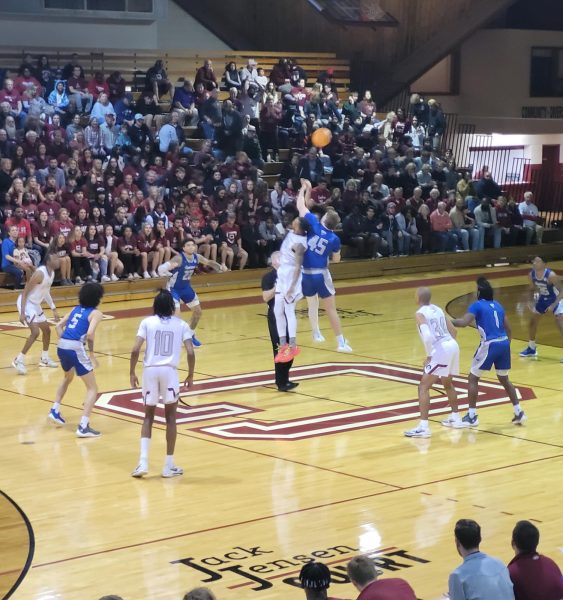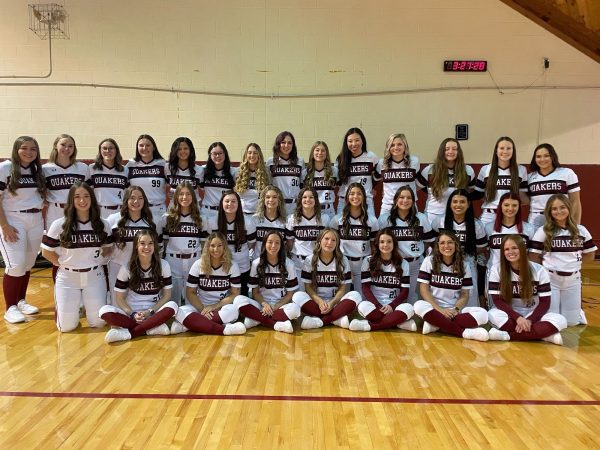Students, faculty claim inequity in sports

On Monday, Oct. 16, a Title IX lawsuit was filed in the U.S. District Court of Middle District of North Carolina by Danny and Kimberly Cash, several former female student athletes of Guilford College and current female student athletes with more than 340 allegations of unfair treatment of female athletes. The suit lists former athletic director and current men’s basketball coach Tom Palombo as well as the College as defendants.
The case came as no surprise, according to President Jane Fernandes.
“We were aware of the likelihood that some individuals might choose to pursue legal action,” said Fernandes, in an email interview on Wed. Nov. 1. “Many people at the college have contributed, and continue to contribute, to making our athletics program a success. We do all of it while being mindful of our budgetary constraints and legal responsibilities.”
A federal complaint requires a response to be filed within 21 days of the complaint. With the case filed on Oct. 16, a legal response by the College is expected Monday, Nov. 6. Claims in the case date back to the fall of 2015 of alleged discrimination against female athletes. The lawsuit is public record and a link to the full-length text can be found on Guilfordian.com.
Felice Duffy, a Title IX lawyer based in Connecticut, will represent the plaintiffs in court. Duffy was the recipient of National Organization for Women Alice Paul Award for Advocacy for the Advancement of Women in 2007. The University of Connecticut alumna won a Title IX case while attending the institution as an undergraduate in 1979, which led to the introduction of a women’s soccer team.
“Even though Title IX has been around a long time (more than 40 years) schools across the country consistently violate Title IX by discriminating against female athletes,” said Duffy, in a video statement found on her office’s website. A link to the video can be found on Guilfordian.com.
The student and former student plaintiffs are seniors Caitlyn Councilman and Sommer Fanney, Gretta Eller ’14, Emily Cash ’15, Tess Stryk ’16, Kate Jenkins-Sullivan ’17 and Laura Adair ’17 of the women’s track & field and cross-country teams, juniors Katherine Holt and Mariella Coscia of the softball team, junior Olivia Winder and Taryn McFadden ’17 of the women’s club rugby team, Allison Hewitt ’15 of the women’s tennis team and Nina Troy ’16 of the swim team.
As stated earlier, the coaches involved are Danny Cash, current head coach of the men’s track & field and cross-country teams and former head coach of the women’s track & field and cross-country team, and his wife Kimberly Cash, former co-head coach of the men’s and women’s track & field and cross-country teams from 2012 to 2016.
“Over the years, athletes and coaches have experienced and voiced concerns about gender equity issues at Guilford,” said Kimberly Cash, in an email interview on Oct. 31. “Because people are still concerned about gender equity issues, the current and former student athletes chose to participate in the actual complaint.”
A central issue of the case deals with 34 C.F.R. § 106.41, pertaining to equity in athletics. The parts of this Code of Federal Regulations brought forth by the suit are “(1) equal athletic participation opportunities (34 C.F.R. §106.41(c)(1))… and (2) equal treatment and benefits to those with participation opportunities (34 C.F.R. §106.41(c)(2)-(9)).”
The complaint alleges that the “Defendant has not taken any recent remedial actions to satisfy its obligations under Title IX. Nor has Defendant ever provided females with an equal opportunity to participate in varsity athletics or provided equal treatment and benefits to its female athletes…any remedial actions which Defendant has taken in the past years have been insufficient to satisfy Defendant’s obligations under Title IX.”
While coach Danny Cash was the head of both track & field and cross-country teams, he allegedly was not given the proper resources and support that was similarly given to the other men’s coaches. The lawsuit outlines this disparity.
“He complained about the unequal treatment and requested equal treatment of female athletes and coaches of female athletes at GC, by, among other things, subjecting him to a hostile environment, removing him as the head coach of women’s T&F XC programs, forcing him to perform coaching and other duties outside his job description, giving him unwarranted negative performance evaluations, mismanaging and manipulating his pay, paying him in a manner GC knew would cause his resignation under a pretext of an increase in pay, and taking other adverse work actions.”
The issues of facility spaces and unequal incomes for female coaches came formulated in the fall of 2015 to the spring of 2016. It was during this period that the suit alleges that Kimberly Cash, while still a coach, approached Palombo and Vice President of Student Affairs Todd Clark on several different occasions to address these issues.
The complaints allege that the locker room space used by the women’s cross-country was also often used for visiting teams and officials, who had preference over the cross-country team. The lawsuit states “this wreaked havoc on the athletes…many times resulting in the need for the female athletes to clear out of the locker room with their belongings or being be locked out of the locker room at the end of their practice, with no place to change.”
According to the 2015-2016 Department of Education’s Equity in Athletics Data Analysis, the average men’s head coach made over $15,000 more than the average women’s head coach. The average assistant men’s coach made nearly $8,000 more than the average women’s assistant coach at Guilford.
The lawsuit asserts that when plans were heard by Fernandes and the College’s administration that the Cashes had planned to meet with a Title IX lawyer, a statement was issued to them saying that the College would dip into the athletic department’s budget for legal defense, which could have led to the termination of coaches, due to subsequent potential budget cuts.
“This is not the open and inclusive environment that I enjoyed when I was a Guilford student, and frankly I find it egregious that the administration failed to address the repeated Title IX complaints from students and staff before it got to the point of a federal lawsuit,” said Michael Costolo ’11, adjunct professor of moot court at Elon University School of Law.
Fernandes said that there are plans to renovate Ragan-Brown Field House, where the locker room spaces are located, to allocate space for more locker rooms for women’s teams.
“Renovation to Ragan-Brown Field House is in our facilities plan and we expect for it to begin within the next few months,” said Fernandes. “There are a number of exciting aspects to the renovation, including the addition of new locker room space. This plan was developed some time ago, and we have been working hard to make it happen.”
The damages sought by the plaintiffs will most likely be bifurcated, meaning it will vary by each student or former-student involved in the case. The amount of damages will reflect the length that each individual plaintiff faced discrimination as a female student athlete.
“It is difficult to calculate how things like lost self-esteem, lost future opportunities, and emotional distress will play into awards for damages among the students involved in the claim,” said Costolo, in an email interview. “I wouldn’t be surprised if we see this case get bifurcated… This will not be a quick trial.”
There are unspecified punitive damages sought against Guilford College. According to Costolo, this could be anywhere up to 10 times the aggregate of other damages.
“It is our desire and hope that Guilford College does the right thing to achieve one of its stated core values, gender equality, so that its students can continue to achieve their goals and be leaders in their chosen careers once they leave Guilford,” said Kimberly Cash. “This situation requires a thoughtful approach and remedy that is good for all of its student body and reflects well as an example to the greater community.”








